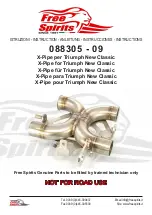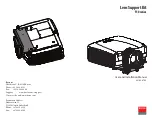
Version Nr. 1-3 - 11.07.2022
Doc. No. 9943301001
5 / 17
5. Functional principle
The cooling unit for enclosures works on the basis of a refrigeration circuit consisting of four main
components: compressor (1), evaporator (2), condenser (3) and expansion device (4).
The circuit is hermetically sealed and R134a refrigerant circulates inside it (R134a is chlorine free and has an
Ozone Destruction Potential [ODP] of 0 and a Global Warming Potential [GWP] of 1430). The compressor
compresses the refrigerant (thus taking it to high pressure and high temperature), and pushes it through the
condenser, where it is cooled by ambient air thus passing from the gas to the liquid state. At the liquid state it
then passes through the capillary pipe being a much lower pressure the refrigerant arrived to the evaporator
where it absorbs the necessary heat to change from liquid to gas state. The gas is then drawn back into the
compressor completing the cycle.
Condensation management
In environments with humidity and low internal enclosure temperatures, condensation may form on the
evaporator coil. Standard cooling units 43XXX0XXX have a drain socket towards the bottom of the unit for
connection of the drain pipe.
Cooling units 43XXX1XX include an internal condensate evaporator based on self-regulating PTC cartridges.
Condensate is drained to an internal recipient where it evaporates when in contact with the cartridge surface.
Resulting steam is directed towards the condenser. The PTC heater cartridge is permanently connected. The
recipient has an overflow socket at the bottom of the unit, for which a drain pipe is supplied.



































